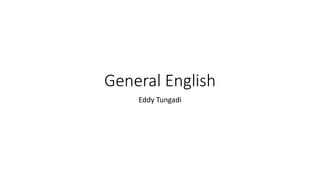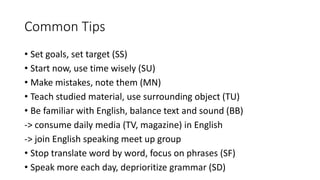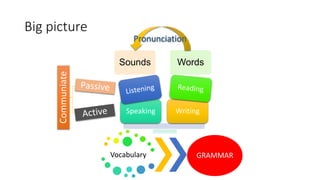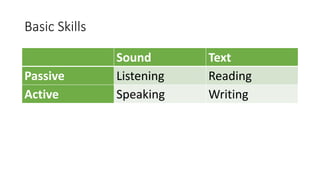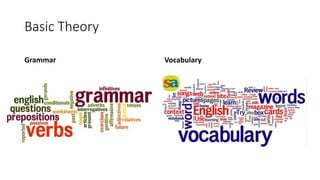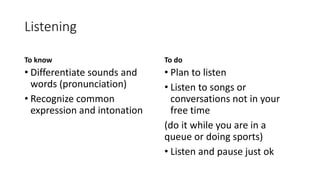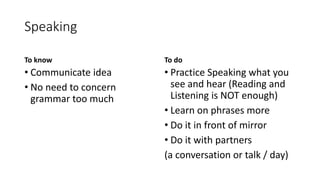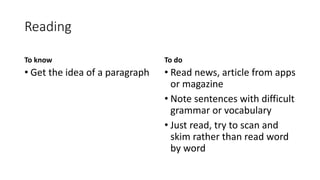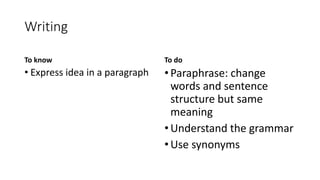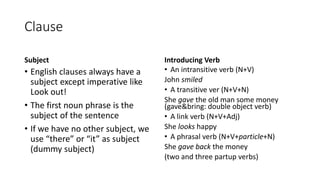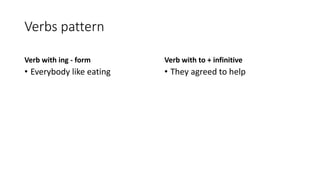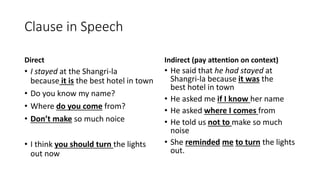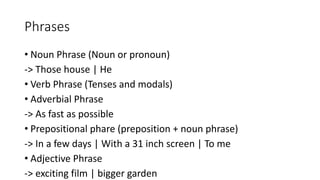General english
- 2. Common Tips • Set goals, set target (SS) • Start now, use time wisely (SU) • Make mistakes, note them (MN) • Teach studied material, use surrounding object (TU) • Be familiar with English, balance text and sound (BB) -> consume daily media (TV, magazine) in English -> join English speaking meet up group • Stop translate word by word, focus on phrases (SF) • Speak more each day, deprioritize grammar (SD)
- 4. Basic Skills Sound Text Passive Listening Reading Active Speaking Writing
- 6. Listening To know • Differentiate sounds and words (pronunciation) • Recognize common expression and intonation To do • Plan to listen • Listen to songs or conversations not in your free time (do it while you are in a queue or doing sports) • Listen and pause just ok
- 7. Speaking To know • Communicate idea • No need to concern grammar too much To do • Practice Speaking what you see and hear (Reading and Listening is NOT enough) • Learn on phrases more • Do it in front of mirror • Do it with partners (a conversation or talk / day)
- 8. Reading To know • Get the idea of a paragraph To do • Read news, article from apps or magazine • Note sentences with difficult grammar or vocabulary • Just read, try to scan and skim rather than read word by word
- 9. Writing To know • Express idea in a paragraph To do •Paraphrase: change words and sentence structure but same meaning •Understand the grammar •Use synonyms
- 10. Grammar
- 11. Grammar Setences Simple Clause Noun Phrase Verb Phrase Other Clause Phrase Phrase Phrase that wh- if
- 12. Subject (Who/What) Budi My children Travelling in Singapore All the girls Budi, who has that Mercy Predicate (what - do) is study Usually takes have cleaned will leave Object (who/whom/what) A clever student English The trash Adverbial (where / when / how) better| with games days by hand next year | for good
- 13. Clause Subject • English clauses always have a subject except imperative like Look out! • The first noun phrase is the subject of the sentence • If we have no other subject, we use “there” or “it” as subject (dummy subject) Introducing Verb • An intransitive verb (N+V) John smiled • A transitive ver (N+V+N) She gave the old man some money (gave&bring: double object verb) • A link verb (N+V+Adj) She looks happy • A phrasal verb (N+V+particle+N) She gave back the money (two and three partup verbs)
- 14. Relative clause • Do not repeat subject or object, if the meaning has already clear The house that we rented it in London was fully furnished • Leave connector out if the meaning is clear You shouldn’t believe everything that you read in the newspaper It was the year when we got married • Noun phrase, time, and place modifier • Quantifiers and numbers She has three brothers, two of whom are in the army • Using which to give more information We missed our train, which means we may be late Subject Object Possessive Who Whom, who Whose Which Which Whose That That
- 15. Verbs pattern Verb with ing - form • Everybody like eating Verb with to + infinitive • They agreed to help
- 16. Clause in Speech Direct • I stayed at the Shangri-la because it is the best hotel in town • Do you know my name? • Where do you come from? • Don’t make so much noice • I think you should turn the lights out now Indirect (pay attention on context) • He said that he had stayed at Shangri-la because it was the best hotel in town • He asked me if I know her name • He asked where I comes from • He told us not to make so much noise • She reminded me to turn the lights out.
- 17. Short forms of Verb As answer • Yes, I can • I hope not or I don’t think so • Maybe not • No, they won’t • Yes it is, isn’t it? (Question tag) • Neither do I (subjunctive) As question • How can I do that? • Did he? Just leave the word out • Yes, I would like • John can come but Jill can’t • He open the door and went in
- 18. Phrases • Noun Phrase (Noun or pronoun) -> Those house | He • Verb Phrase (Tenses and modals) • Adverbial Phrase -> As fast as possible • Prepositional phare (preposition + noun phrase) -> In a few days | With a 31 inch screen | To me • Adjective Phrase -> exciting film | bigger garden

